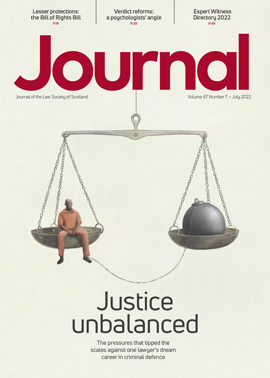Editorial: Rights at stake
It can be difficult to write at a moment when the Government of our country is in imminent danger of collapse. Since this piece was first drafted, it has become clear that we are soon to have a change of Prime Minister. The more important question, however, is what effect, if any, that will have on the current legislative programme, as there have been few criticisms of that from his own side amidst all the tumult.
From a lawyer’s point of view, a particular focus is the Bill of Rights Bill. It has been called out for cutting across the UK’s obligations under international law, and shamefully it is not the only measure now before Parliament that does so.
Even on a domestic level, however, it should cause alarm. It purports to discriminate between those who should and those who should not be able to exercise their rights in full, the latter aspects targeting claimants serving a custodial sentence – the European Convention already takes due account of the limitations on rights that go with such a status – and those threatened with deportation. With human rights, the clue is in the name. They apply to all of humanity.
Even for the rest of us, obstacles are erected that could bar the upholding of their rights. There is a threshold of “significant disadvantage” before proceedings can be brought against a public authority. If that bar is cleared, the courts no longer have the power to read down legislation to make it comply with the Convention, but can only make a declaration; a minister decides what, if any, action to take. Courts are further limited in how their decisions can impact on authorities exercising statutory powers. Authorities are given a shield if acting under legislation incompatible with the Convention. So it goes on.
Lurking beneath the bill is the Government’s belief, maintained despite having been debunked as wholly unsound in law, that enacting domestic legislation incompatible with Treaty or Convention obligations involves no breach of international law. It may become harder for claimants to take a case all the way to a ruling in Strasbourg, but the circumstances in which that might happen are set to multiply and it will be only a matter of time before that fallacy is exposed.
As has also been pointed out in analysis of the bill, its provisions are characteristic of a Government resistant to scrutiny and accountability and, more fundamentally, to the checks and balances that still underpin our constitution though now coming under increasing threat from an unprincipled executive.
For all these reasons, each of which reflects an aspect of the rule of law, lawyers should use every avenue to challenge, or at the very least seek to mitigate, the bill and its dangerous effects. The country which gave birth to the European Convention must not be allowed to disown it.
Perspectives
Features
Briefings
- Civil court: Issues on appeal
- Licensing: Minimum pricing – a genuine impact?
- Insolvency: How to admit joint creditor claims
- Tax: windfall and plastic packaging taxes raise stakes
- Immigration: Asylum system overhauled
- Scottish Solicitors' Discipline Tribunal: July 2022
- In-house: In with the stonework
- Property: Living with the Register of Overseas Entities
In practice
- OPG update: July 2022
- Public policy highlights: July 2022
- Gear up for the Scottish Legal Walks
- Disabled solicitor support group proposed
- Risk: Cybercrime – the hybrid worker prey
- Ask Ash: Piling it on
- TRS: time for a trusts trawl
- Know people, know business
- High street and hybrid
- Appreciation: Ian Leslie Shaw Balfour
- The Expert Witness Directory 2022
- Expert witness: case law update






